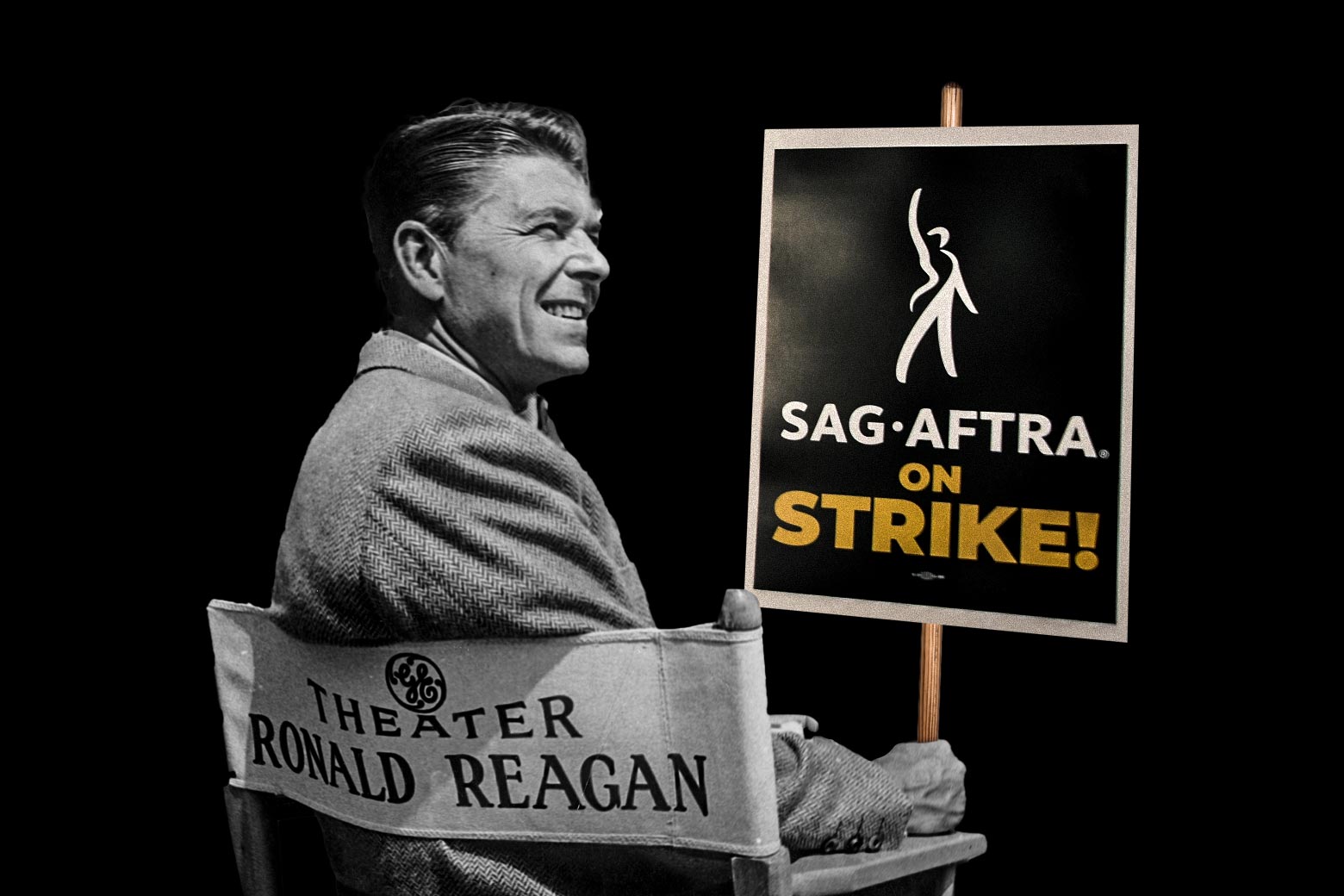THE KING AND JUNTA RULE
Thai Election Winner Seeks to Strip Senate of Voting Power
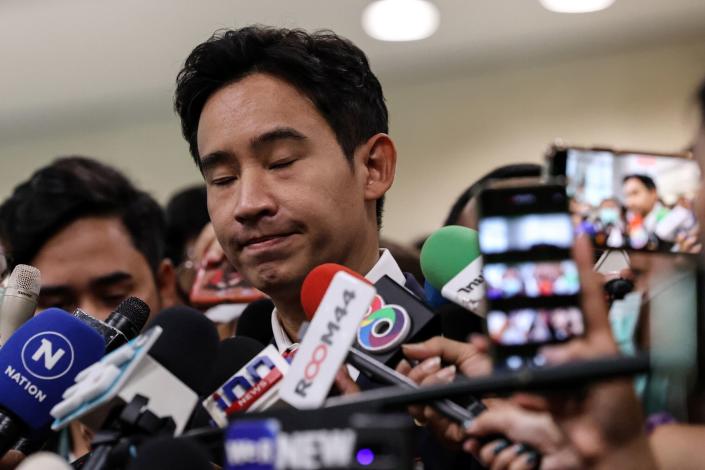
Patpicha Tanakasempipat
Fri, July 14, 2023
(Bloomberg) -- Thailand’s Move Forward, the party that won the most seats in the May general election, is trying to strip some of the Senate’s powers after the military-appointed upper house of parliament blocked pro-democracy leader Pita Limjaroenrat’s bid to become prime minister.
Move Forward submitted a bill Friday to abolish an article in the 2017 military-backed constitution, which gives the unelected Senate the power to select the prime minister alongside the elected lower house.
This isn’t the first time that someone is trying to challenge the Senate’s voting right. Six attempts have been made in vain since 2020 by political parties and civil society groups to curb the power of the Senate, because such a proposal ironically needs support from at least a third of the 250-member upper house to pass.
Move Forward’s submission came a day after its leader Pita, the sole nominee of the eight-party coalition that has staked a claim to form Thailand’s next government, was thwarted in his bid for premiership by senators, the majority of whom rejected Pita outright or abstained from voting. In doing so, they undermined the result of the May 14 election where voters had overwhelmingly supported pro-democracy parties.
“We don’t know how many times the prime minister selection will be held until it concludes. So, we can do this hand in hand,” Chaithawat Tulathon, secretary-general of Move Forward Party, told reporters at the parliament house. “Since the Senate didn’t want to vote anyway, we’re only looking for a solution for everybody.”
Among the 250-member Senate, as many as 159 members abstained from voting and 34 voted against Pita outright on Thursday. Only 13 backed the popular mandate. But Chaithawat said the party will seek support from more senators for Pita at the next round of prime minister selection next week.
Many members cited Move Forward’s platform to amend Thailand’s lese majeste law, which prohibits criticism of the king or other royals, as a reason for withholding support. Pita has vowed to not back down on the proposal, raising further tension with the pro-military royalist establishment.
The bill was accepted by house speaker Wan Muhamad Noor Matha, who confirmed at the briefing that the second vote to select the prime minister will be held by the joint National Assembly on July 19, at 9:30 a.m. in Bangkok.
“I’ll process this as soon as possible as this is an urgent matter,” Wan said.
Thai Election Winner Seeks to Strip Senate of Voting Power

Patpicha Tanakasempipat
Fri, July 14, 2023
(Bloomberg) -- Thailand’s Move Forward, the party that won the most seats in the May general election, is trying to strip some of the Senate’s powers after the military-appointed upper house of parliament blocked pro-democracy leader Pita Limjaroenrat’s bid to become prime minister.
Move Forward submitted a bill Friday to abolish an article in the 2017 military-backed constitution, which gives the unelected Senate the power to select the prime minister alongside the elected lower house.
This isn’t the first time that someone is trying to challenge the Senate’s voting right. Six attempts have been made in vain since 2020 by political parties and civil society groups to curb the power of the Senate, because such a proposal ironically needs support from at least a third of the 250-member upper house to pass.
Move Forward’s submission came a day after its leader Pita, the sole nominee of the eight-party coalition that has staked a claim to form Thailand’s next government, was thwarted in his bid for premiership by senators, the majority of whom rejected Pita outright or abstained from voting. In doing so, they undermined the result of the May 14 election where voters had overwhelmingly supported pro-democracy parties.
“We don’t know how many times the prime minister selection will be held until it concludes. So, we can do this hand in hand,” Chaithawat Tulathon, secretary-general of Move Forward Party, told reporters at the parliament house. “Since the Senate didn’t want to vote anyway, we’re only looking for a solution for everybody.”
Among the 250-member Senate, as many as 159 members abstained from voting and 34 voted against Pita outright on Thursday. Only 13 backed the popular mandate. But Chaithawat said the party will seek support from more senators for Pita at the next round of prime minister selection next week.
Many members cited Move Forward’s platform to amend Thailand’s lese majeste law, which prohibits criticism of the king or other royals, as a reason for withholding support. Pita has vowed to not back down on the proposal, raising further tension with the pro-military royalist establishment.
The bill was accepted by house speaker Wan Muhamad Noor Matha, who confirmed at the briefing that the second vote to select the prime minister will be held by the joint National Assembly on July 19, at 9:30 a.m. in Bangkok.
“I’ll process this as soon as possible as this is an urgent matter,” Wan said.
Bloomberg Businessweek
Thailand's Move Forward seeks to curb Senate powers after loss in PM vote
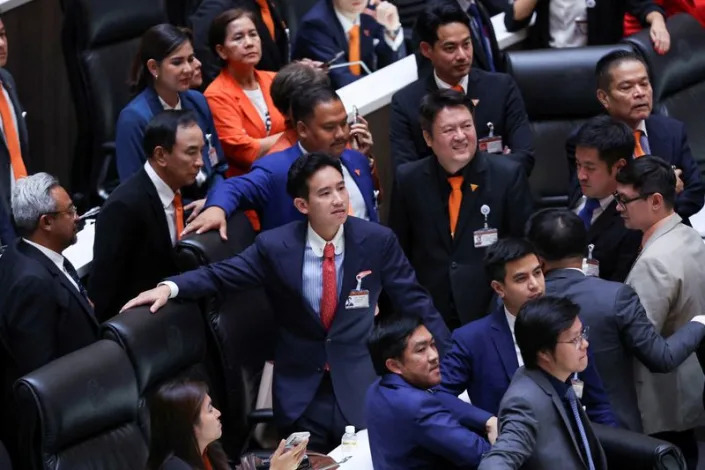
Thailand's parliament votes for a new prime minister
Updated Fri, July 14, 2023
By Chayut Setboonsarng and Panarat Thepgumpanat
BANGKOK (Reuters) -Thailand's Move Forward party filed a motion in parliament on Friday seeking to curb the power of the military-appointed Senate, a day after the body thwarted its party leader's bid to become prime minister.
The role of the 249-member Senate in deciding a prime minister along with the elected lower house - a system designed by the royalist military after a 2014 coup - is seen as a constitutional safeguard to protect the interests of the generals and the conservative establishment.
Move Forward won the most seats in an election in May but despite being unopposed and having the backing of his eight-party alliance, its leader Pita Limjaroenrat lost the crucial vote on the premiership on Thursday, after the Senate and parties of the outgoing, army-backed government closed ranks to deny him the top job.
Only 13 senators backed 42-year-old Pita, with the rest voting against him or abstaining, which his party said indicated some were acting under duress.
Party secretary general Chaithawat Tulathon filed a motion on Friday to amend part of the constitution, saying "This is a solution that all sides will feel comfortable with".
"There are forces from the old power to pressure the Senate - from the old power to some capitalists who do not want to see a Move Forward government," he said in an earlier television interview, adding it could take about one month to pass.
Pita, a liberal from the private sector, has won huge youth support for his plan to shake up politics and bring reforms to sectors and institutions long considered untouchable.
That includes the monarchy, more specifically, a law that prohibits insulting it, by far Move Forward's most contentious policy and a big obstacle in its attempts to persuade legislators to back Pita.
MAJOR BLOW
Pita vowed on Thursday not to abandon those policies or give up his fight for the premiership. He can run again if nominated in the next vote for the post, which takes place on July 19, the House speaker confirmed.
The defeat on Thursday followed a major blow for Pita on the eve of the vote, when the election commission recommended he be disqualified over a shareholding issue, followed hours later by the Constitutional Court announcing it had taken on a complaint over his party's plan to amend the royal insult law.
The political tension this week had been widely expected.
Thailand has been locked for two decades in a power struggle between reform-minded parties that win elections and a nexus of old money and the military establishment determined to stifle them.
Pro-democracy groups have called for protests. Activist group the United Front of Thammasat and Demonstration took aim at the senators and those who abstained in the vote, calling them spineless and "toxic to the will of people".
Thitinan Pongsudhirak, a political science professor at Chulalongkorn University, called the constitution a straitjacket on democracy, and said systematic attempts to stop Move Forward would see a public backlash.
"These old guard institutions, they need to maintain power because they have a lot to lose," he said.
"The kind of change that Move Forward demands would unwind Thailand's monarchy-centred system and then it would unlock institutional reforms... this would unleash a lot of the competitiveness of Thailand, Thailand's potential."
(Additional reporting by Napat Wesshasarter and Juarawee KittisilpaWriting by Martin PettyEditing by Frances Kerry)

Thailand's parliament votes for a new prime minister
Updated Fri, July 14, 2023
By Chayut Setboonsarng and Panarat Thepgumpanat
BANGKOK (Reuters) -Thailand's Move Forward party filed a motion in parliament on Friday seeking to curb the power of the military-appointed Senate, a day after the body thwarted its party leader's bid to become prime minister.
The role of the 249-member Senate in deciding a prime minister along with the elected lower house - a system designed by the royalist military after a 2014 coup - is seen as a constitutional safeguard to protect the interests of the generals and the conservative establishment.
Move Forward won the most seats in an election in May but despite being unopposed and having the backing of his eight-party alliance, its leader Pita Limjaroenrat lost the crucial vote on the premiership on Thursday, after the Senate and parties of the outgoing, army-backed government closed ranks to deny him the top job.
Only 13 senators backed 42-year-old Pita, with the rest voting against him or abstaining, which his party said indicated some were acting under duress.
Party secretary general Chaithawat Tulathon filed a motion on Friday to amend part of the constitution, saying "This is a solution that all sides will feel comfortable with".
"There are forces from the old power to pressure the Senate - from the old power to some capitalists who do not want to see a Move Forward government," he said in an earlier television interview, adding it could take about one month to pass.
Pita, a liberal from the private sector, has won huge youth support for his plan to shake up politics and bring reforms to sectors and institutions long considered untouchable.
That includes the monarchy, more specifically, a law that prohibits insulting it, by far Move Forward's most contentious policy and a big obstacle in its attempts to persuade legislators to back Pita.
MAJOR BLOW
Pita vowed on Thursday not to abandon those policies or give up his fight for the premiership. He can run again if nominated in the next vote for the post, which takes place on July 19, the House speaker confirmed.
The defeat on Thursday followed a major blow for Pita on the eve of the vote, when the election commission recommended he be disqualified over a shareholding issue, followed hours later by the Constitutional Court announcing it had taken on a complaint over his party's plan to amend the royal insult law.
The political tension this week had been widely expected.
Thailand has been locked for two decades in a power struggle between reform-minded parties that win elections and a nexus of old money and the military establishment determined to stifle them.
Pro-democracy groups have called for protests. Activist group the United Front of Thammasat and Demonstration took aim at the senators and those who abstained in the vote, calling them spineless and "toxic to the will of people".
Thitinan Pongsudhirak, a political science professor at Chulalongkorn University, called the constitution a straitjacket on democracy, and said systematic attempts to stop Move Forward would see a public backlash.
"These old guard institutions, they need to maintain power because they have a lot to lose," he said.
"The kind of change that Move Forward demands would unwind Thailand's monarchy-centred system and then it would unlock institutional reforms... this would unleash a lot of the competitiveness of Thailand, Thailand's potential."
(Additional reporting by Napat Wesshasarter and Juarawee KittisilpaWriting by Martin PettyEditing by Frances Kerry)
Ambitious liberal fails in first bid to become Thailand's next leader
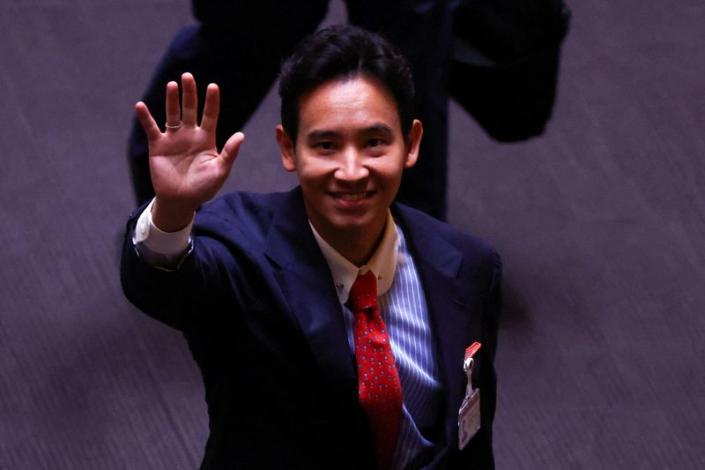
Thailand's parliament votes for a new prime minister

Thailand's parliament votes for a new prime minister
Thu, July 13, 2023
By Devjyot Ghoshal and Panu Wongcha-um
BANGKOK (Reuters) - In the 60 days since a stunning election victory, the leader of Thailand's Move Forward party forged and managed a coalition, cajoled the royalist military establishment and rallied his troops with a single goal - to become prime minister.
On Thursday, 42-year-old Pita Limjaroenrat failed in his initial bid to win the premiership after he was unable to secure enough votes in a joint sitting of Thailand's 750-member parliament. Another vote is expected to be held next week, which Pita can contest if nominated again.
The setback came despite Move Forward's victory in the May general election, where it emerged the single largest party after running a slick, social-media powered campaign that promised progressive, transparent government to Thai voters.-
But Pita and Move Forward's agenda - particularly a once-unthinkable proposal to amend Thailand's "lese majeste" law - also pit them against the country's powerful conservative establishment, which controls the 250-member appointed senate.
"Give Thailand the opportunity to have a majority government according to the will of the people," he said in a video message on Tuesday, reiterating a call to elected and unelected lawmakers to support him in the bicameral vote.
"I can be a prime minister who runs a country that embraces everybody's diverse dreams," he said.
Yet, by Wednesday afternoon - less than a day before the vote - Pita's quest for power was hit by a double-whammy.
First, Thailand's election commission recommended the Constitutional Court disqualify Pita as a lawmaker because of his ownership of shares in a media company in violation of electoral rules.
Second, the Constitutional Court said it had accepted a complaint against Pita and his party over plans to amend the lese majeste law, Article 112 of the criminal code that punishes insulting the monarchy with up to 15 years in prison.
The actions were a throwback to 2020, when a court ordered the predecessor party of Move Forward dissolved and some of its leaders banned from politics for a decade for violations of election rules.
It was into that breach that Pita - then a first-term lawmaker from a politically influential family with experience working in the technology sector - stepped, becoming the leader of the newly-formed Move Forward.
The position foisted the Harvard University graduate on to the centre stage of Thai politics, which was roiled by a youth-led reformist movement that saw thousands take to the streets, sometimes leading to violent clashes in the heart of Bangkok.
The young protesters took on the military-backed rulers head on, calling for deep-seated reforms, a new constitution and questioning the monarchy's long-held influence on politics and society.
Some of those protesters - and some of those demands - were part of Move Forward's electoral juggernaut, including a call to amend the lese majeste law.
'ABLE TO COMPROMISE'
In a country where many consider the monarch semi-divine, analysts doubted whether a Pita-led Move Forward would be able to push aside a raft of conservative and pro-establishment parties that had dominated domestic politics for over a decade.
At the hustings, Pita drew large, adoring crowds - many of them young voters. The party's trademark orange logo and sharp messaging flooded social media. Late in the campaign, the first-time prime ministerial candidate saw a surge in popularity.
"Vote for Move Forward to change this country together," Pita said in a slick campaign video, taking off a pair of sunglasses and winking.
To millions of Thais weary of an almost decade-long military-backed rule, Pita offered an raft of changes, including increase in minimum wages, dismantling of business monopolies, streamlining of the armed forces and legalising same-sex marriage.
When the numbers rolled in late on May 14, Move Forward not only trounced the ruling coalition but also bettered the populist Pheu Thai Party - the opposition outfit backed by self-exiled tycoon Thaksin Shinawatra, a former prime minister.
The outcome pushed Pita to switch gears from candidate to coalition builder, as a group of seven parties - including the Pheu Thai - coalesced around Move Forward to win power.
"Pita is a democratic representative who can elevate Thailand on the global stage in a dignified way," said Kannawee Suebsang, a member of parliament from the Fair Party, which is part of Pita's eight party-coalition.
"He is a strong leader with charisma but is also able to compromise."
(Reporting by Devjyot Ghoshal and Panu Wongcha-um; Editing by Nick Macfie)
By Devjyot Ghoshal and Panu Wongcha-um
BANGKOK (Reuters) - In the 60 days since a stunning election victory, the leader of Thailand's Move Forward party forged and managed a coalition, cajoled the royalist military establishment and rallied his troops with a single goal - to become prime minister.
On Thursday, 42-year-old Pita Limjaroenrat failed in his initial bid to win the premiership after he was unable to secure enough votes in a joint sitting of Thailand's 750-member parliament. Another vote is expected to be held next week, which Pita can contest if nominated again.
The setback came despite Move Forward's victory in the May general election, where it emerged the single largest party after running a slick, social-media powered campaign that promised progressive, transparent government to Thai voters.-
But Pita and Move Forward's agenda - particularly a once-unthinkable proposal to amend Thailand's "lese majeste" law - also pit them against the country's powerful conservative establishment, which controls the 250-member appointed senate.
"Give Thailand the opportunity to have a majority government according to the will of the people," he said in a video message on Tuesday, reiterating a call to elected and unelected lawmakers to support him in the bicameral vote.
"I can be a prime minister who runs a country that embraces everybody's diverse dreams," he said.
Yet, by Wednesday afternoon - less than a day before the vote - Pita's quest for power was hit by a double-whammy.
First, Thailand's election commission recommended the Constitutional Court disqualify Pita as a lawmaker because of his ownership of shares in a media company in violation of electoral rules.
Second, the Constitutional Court said it had accepted a complaint against Pita and his party over plans to amend the lese majeste law, Article 112 of the criminal code that punishes insulting the monarchy with up to 15 years in prison.
The actions were a throwback to 2020, when a court ordered the predecessor party of Move Forward dissolved and some of its leaders banned from politics for a decade for violations of election rules.
It was into that breach that Pita - then a first-term lawmaker from a politically influential family with experience working in the technology sector - stepped, becoming the leader of the newly-formed Move Forward.
The position foisted the Harvard University graduate on to the centre stage of Thai politics, which was roiled by a youth-led reformist movement that saw thousands take to the streets, sometimes leading to violent clashes in the heart of Bangkok.
The young protesters took on the military-backed rulers head on, calling for deep-seated reforms, a new constitution and questioning the monarchy's long-held influence on politics and society.
Some of those protesters - and some of those demands - were part of Move Forward's electoral juggernaut, including a call to amend the lese majeste law.
'ABLE TO COMPROMISE'
In a country where many consider the monarch semi-divine, analysts doubted whether a Pita-led Move Forward would be able to push aside a raft of conservative and pro-establishment parties that had dominated domestic politics for over a decade.
At the hustings, Pita drew large, adoring crowds - many of them young voters. The party's trademark orange logo and sharp messaging flooded social media. Late in the campaign, the first-time prime ministerial candidate saw a surge in popularity.
"Vote for Move Forward to change this country together," Pita said in a slick campaign video, taking off a pair of sunglasses and winking.
To millions of Thais weary of an almost decade-long military-backed rule, Pita offered an raft of changes, including increase in minimum wages, dismantling of business monopolies, streamlining of the armed forces and legalising same-sex marriage.
When the numbers rolled in late on May 14, Move Forward not only trounced the ruling coalition but also bettered the populist Pheu Thai Party - the opposition outfit backed by self-exiled tycoon Thaksin Shinawatra, a former prime minister.
The outcome pushed Pita to switch gears from candidate to coalition builder, as a group of seven parties - including the Pheu Thai - coalesced around Move Forward to win power.
"Pita is a democratic representative who can elevate Thailand on the global stage in a dignified way," said Kannawee Suebsang, a member of parliament from the Fair Party, which is part of Pita's eight party-coalition.
"He is a strong leader with charisma but is also able to compromise."
(Reporting by Devjyot Ghoshal and Panu Wongcha-um; Editing by Nick Macfie)
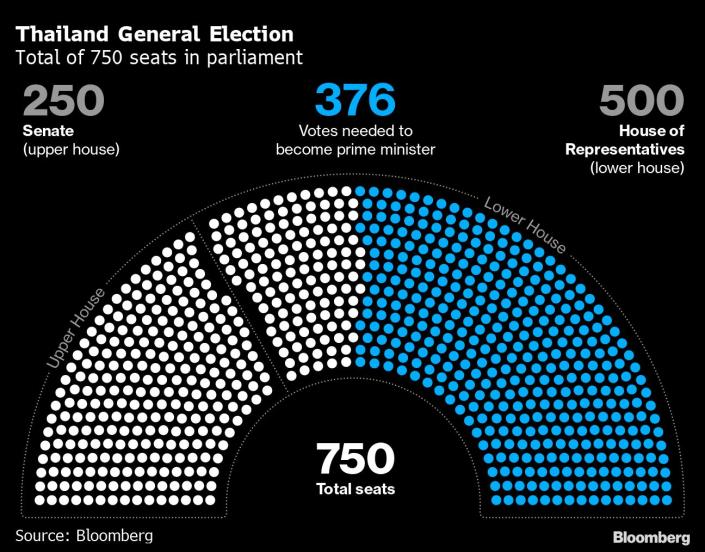
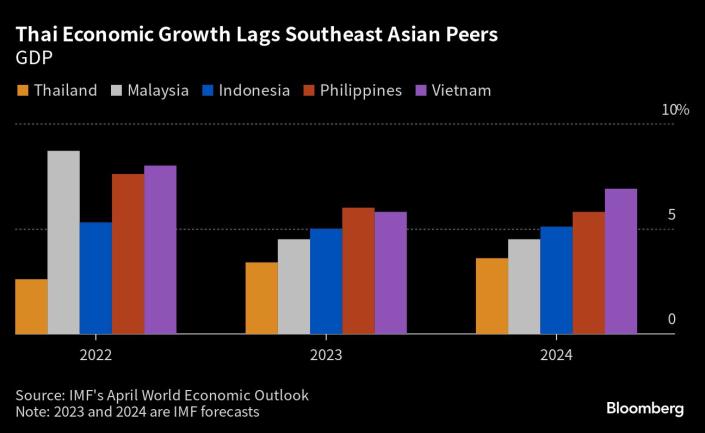
Philip J. Heijmans and Patpicha Tanakasempipat
Thu, July 13, 2023
(Bloomberg) -- After failing to win over Thai conservatives in his first attempt to become prime minister, things are looking increasingly difficult for pro-democracy leader Pita Limjaroenrat to secure a victory even if he were to try again.
The parties outside of Pita’s Move Forward-led coalition and the majority of military-appointed senators are opposed to his key campaign promise of amending the so-called lese majeste law that punishes anyone for defaming or insulting the king or other royals.-
Also, the Harvard-educated politician risks disqualification as a lawmaker after the poll body found him in breach of election rules — saying he held shares in a defunct media company while running for public office. While he may still go for a second chance at premiership when parliament meets next on July 19, analysts expect support for Pita to wear thin within his alliance should he lose again; although there’s no limit on the number of re-votes he can seek.
“I think they will run him again,” said Kevin Hewison, emeritus professor of Asian Studies at the University of North Carolina at Chapel Hill. Another attempt by Pita will probably harden the stance of conservatives and only weaken support for the pro-democracy alliance, according to Hewison.
The longer it takes for Thailand to form a new government, the more investors will lose confidence in the $500 billion economy whose expansion has been lagging emerging-market peers in Southeast Asia through the pandemic and after. Political wrangling between pro-democracy and conservative groups have also hurt the country’s stocks, bonds and currency markets.
Here are some other scenarios that could play out:
Pita Supports Pheu Thai
Pita could step aside and instead support his coalition partner Pheu Thai, which finished second-place in the May 14 general election and is linked to exiled former leader Thaksin Shinawatra.
Isra Sunthornvut, a former member of parliament for the Democrat Party, said he wouldn’t be surprised if next week Pita throws his support behind Pheu Thai to lead the government “for the sake of the country and democracy.”
The only challenge to this scenario is that Pheu Thai may find it difficult to muster support from the conservatives while still being an ally of Move Forward, which has refused to back down on its push to amend the royal insult law.
Pro-Democracy Group Splits
That could leave Pheu Thai inclined to consider breaking away from Move Forward’s coalition and try forming a government led by one of its three candidates for the post, including real estate magnate Srettha Thavisin and Paetongtarn Shinawatra, the youngest daughter of Thaksin.
Thaksin, who has been considering returning home, had previously said Pheu Thai would not support any attempt to reform the lese majeste law. That makes it easier for Pheu Thai to win enough support from the 250-member military-appointed Senate, helping put a new government sooner than later.
The private sector wants the new government to be in place as soon as possible, so our economy can continue to grow as expected, Thai Chamber of Commerce Chairman Sanan Angubolkul said Friday.
Military-Backed Minority Government
A third scenario involves the Senate supporting a minority government led either by Bhumjaithai’s Anutin Charnvirakul or one of the military-backed parties. That outcome, however, risks sparking protests by supporters of pro-democracy groups.
Since the Senate’s ability to vote for the prime minister expires next year, any minority government is at risk of falling in a no-confidence vote. To guard against that, it’s possible that the establishment may petition the courts to disband Move Forward as what happened in the past to their predecessor, using the push to amend the royal insult law as a pretext, and even annul the election result.
“But that might take some time,” Hewison said referring to the process of disbanding Move Forward and annulling the result. “That said, going to an election quickly is unlikely to produce a different result. But conservatives in Thailand are a balmy lot.”
However, any move to ban the nation’s popular politicians may lead to massive demonstrations. And this time the risks are even higher for the royalist establishment, as protesters have recently been much bolder in directly targeting the monarchy than in previous years.
Such a turn of events could end up hurting tourism, the only economic engine that’s firing on full cylinders and supporting Thailand’s growth amid a downturn in global demand for goods.
--With assistance from Suttinee Yuvejwattana, Cecilia Yap and Anuchit Nguyen.
The parties outside of Pita’s Move Forward-led coalition and the majority of military-appointed senators are opposed to his key campaign promise of amending the so-called lese majeste law that punishes anyone for defaming or insulting the king or other royals.-
Also, the Harvard-educated politician risks disqualification as a lawmaker after the poll body found him in breach of election rules — saying he held shares in a defunct media company while running for public office. While he may still go for a second chance at premiership when parliament meets next on July 19, analysts expect support for Pita to wear thin within his alliance should he lose again; although there’s no limit on the number of re-votes he can seek.
“I think they will run him again,” said Kevin Hewison, emeritus professor of Asian Studies at the University of North Carolina at Chapel Hill. Another attempt by Pita will probably harden the stance of conservatives and only weaken support for the pro-democracy alliance, according to Hewison.
The longer it takes for Thailand to form a new government, the more investors will lose confidence in the $500 billion economy whose expansion has been lagging emerging-market peers in Southeast Asia through the pandemic and after. Political wrangling between pro-democracy and conservative groups have also hurt the country’s stocks, bonds and currency markets.
Here are some other scenarios that could play out:
Pita Supports Pheu Thai
Pita could step aside and instead support his coalition partner Pheu Thai, which finished second-place in the May 14 general election and is linked to exiled former leader Thaksin Shinawatra.
Isra Sunthornvut, a former member of parliament for the Democrat Party, said he wouldn’t be surprised if next week Pita throws his support behind Pheu Thai to lead the government “for the sake of the country and democracy.”
The only challenge to this scenario is that Pheu Thai may find it difficult to muster support from the conservatives while still being an ally of Move Forward, which has refused to back down on its push to amend the royal insult law.
Pro-Democracy Group Splits
That could leave Pheu Thai inclined to consider breaking away from Move Forward’s coalition and try forming a government led by one of its three candidates for the post, including real estate magnate Srettha Thavisin and Paetongtarn Shinawatra, the youngest daughter of Thaksin.
Thaksin, who has been considering returning home, had previously said Pheu Thai would not support any attempt to reform the lese majeste law. That makes it easier for Pheu Thai to win enough support from the 250-member military-appointed Senate, helping put a new government sooner than later.
The private sector wants the new government to be in place as soon as possible, so our economy can continue to grow as expected, Thai Chamber of Commerce Chairman Sanan Angubolkul said Friday.
Military-Backed Minority Government
A third scenario involves the Senate supporting a minority government led either by Bhumjaithai’s Anutin Charnvirakul or one of the military-backed parties. That outcome, however, risks sparking protests by supporters of pro-democracy groups.
Since the Senate’s ability to vote for the prime minister expires next year, any minority government is at risk of falling in a no-confidence vote. To guard against that, it’s possible that the establishment may petition the courts to disband Move Forward as what happened in the past to their predecessor, using the push to amend the royal insult law as a pretext, and even annul the election result.
“But that might take some time,” Hewison said referring to the process of disbanding Move Forward and annulling the result. “That said, going to an election quickly is unlikely to produce a different result. But conservatives in Thailand are a balmy lot.”
However, any move to ban the nation’s popular politicians may lead to massive demonstrations. And this time the risks are even higher for the royalist establishment, as protesters have recently been much bolder in directly targeting the monarchy than in previous years.
Such a turn of events could end up hurting tourism, the only economic engine that’s firing on full cylinders and supporting Thailand’s growth amid a downturn in global demand for goods.
--With assistance from Suttinee Yuvejwattana, Cecilia Yap and Anuchit Nguyen.
Thailand's Election Commission says a reformist candidate for prime minister may have broken the law

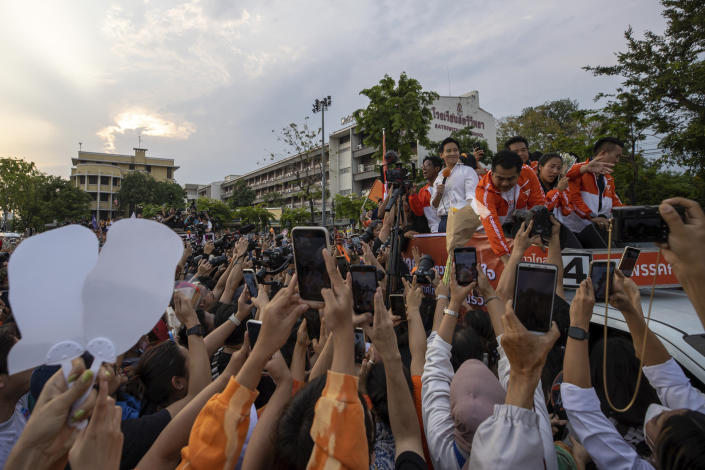
Leader of Move Forward Party Pita Limjaroenrat arrives before the signing of a memorandum of understanding on attempt to form a coalition government between Move Forward Party and other parties during a news conference in Bangkok, Thailand on May 22, 2023.
JINTAMAS SAKSORNCHAI and GRANT PECK
Updated Wed, July 12, 2023
BANGKOK (AP) — Thailand’s Election Commission said Wednesday there is evidence that the top candidate to become the next prime minister — a reformist with strong backing among progressive young voters — violated election law and referred his case to the Constitutional Court.
The commission’s decision included a request that the court order Move Forward Party leader Pita Limjaroenrat to be suspended as a member of Parliament until the panel issues a ruling.
The alleged violation involves undeclared ownership of media company shares, which are banned for lawmakers. Separately, the court also said it would review a complaint that Pita and his party may have violated the law by proposing to amend Thailand's strict legal provision against defaming the monarchy. Thai media said the court would not make any ruling on Wednesday and that it might need some to consider the issues.
Pita can still be nominated on Thursday when Parliament meets to vote for a new prime minister. But the commission's move raises new doubts about whether he can muster enough votes to get the post, already a struggle because of Thailand's deep political divisions.
The Move Forward Party, with a progressive reformist platform, swept to a surprise first-place finish in May’s general election, capturing 151 seats in the 500-member House of Representatives and the most popular votes. Move Forward has assembled an eight-party, 311-seat coalition with which it had planned to take power.
But Pita's path to power is difficult because he must win 376 votes in a joint session of the House and the conservative, 250-seat, non-elected Senate. The Senate largely represents Thailand's traditional ruling establishment, which suspects Move Forward's proposals for minor reforms of the monarchy endanger the royal institution, which they consider to be the center of Thais' national identity.
Pita's party responded to the Election Commission's decision by questioning its fairness and even its legality. It said its decision was unnecessarily hurried and violated its own procedures by failing to call Pita to give a statement.
The commission had earlier said it acted correctly but Move Forward alleges its members may have engaged in malfeasance, or carrying out duties in a wrongful manner, a crime punishable by 10 years imprisonment and a fine.
The election law complaint against Pita, lodged by a member of a rival party, alleges he ran for office in 2019 while failing to declare his shares in a media company.
The case the commission referred to the court accuses Pita of running for office with awareness that he was ineligible, a criminal violation punishable by maximum imprisonment of three years and/or a fine of up to 60,000 baht ($1,720). The party faces a fine of up to 100,000 baht ($2,865).
Caretaker Deputy Prime Minister Wissanu Krea-ngam, the government’s top legal advisor, has been quoted as saying that a ruling against Pita could be grounds for nullifying the May election results and holding a new election.
There have been fears since the election that Thailand’s conservative ruling establishment would use what its political opponents consider to be dirty tricks to hold on to power. For a decade-and-a-half, it has repeatedly used the courts and supposedly independent state agencies such as the Election Commission to issue controversial rulings to cripple or sink political opponents.
The dissolution in 2019 of the Future Forward party, a forerunner of Move Forward, triggered vigorous street protests by pro-democracy activists that trailed off only when the coronavirus pandemic took hold.
Hours after the Election Commission announced its referral of the shareholding case, the Constitutional Court said it had has accepted a separate petition against Move Forward and Pita concerning their campaign promise to amend Thailand's harsh lese majeste law,.
The law, also known as Article 112, mandates a three to 15 year prison term for defaming the king, his immediate family, or the regent. Critics of the law say it is abused for political purposes, and Move Forward wants changes to rein in such abuses, which it claims actually do damage to the monarchy's reputation.
Royalists soundly reject all efforts to amend the law, and courts have sometimes treated such proposals themselves as tantamount to violating the law. The military and the courts consider themselves stalwart defenders of the monarchy, and the Senate members overwhelmingly share their viewpoint.
If the court agrees that the accused's actions constitute trying to overthrow the constitutional monarchy — a separate provision from Article 112 — they will not be subject to punishment but can be ordered to cease all activities related to their proposed amendment, subject to prosecution if they continue.


Leader of Move Forward Party Pita Limjaroenrat arrives before the signing of a memorandum of understanding on attempt to form a coalition government between Move Forward Party and other parties during a news conference in Bangkok, Thailand on May 22, 2023.
Thailand's state Election Commission announced Wednesday, July 12, it has concluded there is evidence that the top candidate to become the country's next prime minister, Move Forward party leader Pita Limjaroenrat, has violated election law, and has referred his case to the Constitutional Court for a ruling. (AP Photo/Sakchai Lalit, File)
JINTAMAS SAKSORNCHAI and GRANT PECK
Updated Wed, July 12, 2023
BANGKOK (AP) — Thailand’s Election Commission said Wednesday there is evidence that the top candidate to become the next prime minister — a reformist with strong backing among progressive young voters — violated election law and referred his case to the Constitutional Court.
The commission’s decision included a request that the court order Move Forward Party leader Pita Limjaroenrat to be suspended as a member of Parliament until the panel issues a ruling.
The alleged violation involves undeclared ownership of media company shares, which are banned for lawmakers. Separately, the court also said it would review a complaint that Pita and his party may have violated the law by proposing to amend Thailand's strict legal provision against defaming the monarchy. Thai media said the court would not make any ruling on Wednesday and that it might need some to consider the issues.
Pita can still be nominated on Thursday when Parliament meets to vote for a new prime minister. But the commission's move raises new doubts about whether he can muster enough votes to get the post, already a struggle because of Thailand's deep political divisions.
The Move Forward Party, with a progressive reformist platform, swept to a surprise first-place finish in May’s general election, capturing 151 seats in the 500-member House of Representatives and the most popular votes. Move Forward has assembled an eight-party, 311-seat coalition with which it had planned to take power.
But Pita's path to power is difficult because he must win 376 votes in a joint session of the House and the conservative, 250-seat, non-elected Senate. The Senate largely represents Thailand's traditional ruling establishment, which suspects Move Forward's proposals for minor reforms of the monarchy endanger the royal institution, which they consider to be the center of Thais' national identity.
Pita's party responded to the Election Commission's decision by questioning its fairness and even its legality. It said its decision was unnecessarily hurried and violated its own procedures by failing to call Pita to give a statement.
The commission had earlier said it acted correctly but Move Forward alleges its members may have engaged in malfeasance, or carrying out duties in a wrongful manner, a crime punishable by 10 years imprisonment and a fine.
The election law complaint against Pita, lodged by a member of a rival party, alleges he ran for office in 2019 while failing to declare his shares in a media company.
The case the commission referred to the court accuses Pita of running for office with awareness that he was ineligible, a criminal violation punishable by maximum imprisonment of three years and/or a fine of up to 60,000 baht ($1,720). The party faces a fine of up to 100,000 baht ($2,865).
Caretaker Deputy Prime Minister Wissanu Krea-ngam, the government’s top legal advisor, has been quoted as saying that a ruling against Pita could be grounds for nullifying the May election results and holding a new election.
There have been fears since the election that Thailand’s conservative ruling establishment would use what its political opponents consider to be dirty tricks to hold on to power. For a decade-and-a-half, it has repeatedly used the courts and supposedly independent state agencies such as the Election Commission to issue controversial rulings to cripple or sink political opponents.
The dissolution in 2019 of the Future Forward party, a forerunner of Move Forward, triggered vigorous street protests by pro-democracy activists that trailed off only when the coronavirus pandemic took hold.
Hours after the Election Commission announced its referral of the shareholding case, the Constitutional Court said it had has accepted a separate petition against Move Forward and Pita concerning their campaign promise to amend Thailand's harsh lese majeste law,.
The law, also known as Article 112, mandates a three to 15 year prison term for defaming the king, his immediate family, or the regent. Critics of the law say it is abused for political purposes, and Move Forward wants changes to rein in such abuses, which it claims actually do damage to the monarchy's reputation.
Royalists soundly reject all efforts to amend the law, and courts have sometimes treated such proposals themselves as tantamount to violating the law. The military and the courts consider themselves stalwart defenders of the monarchy, and the Senate members overwhelmingly share their viewpoint.
If the court agrees that the accused's actions constitute trying to overthrow the constitutional monarchy — a separate provision from Article 112 — they will not be subject to punishment but can be ordered to cease all activities related to their proposed amendment, subject to prosecution if they continue.
Analysis-Thailand's monarchy looms over battle for prime minister

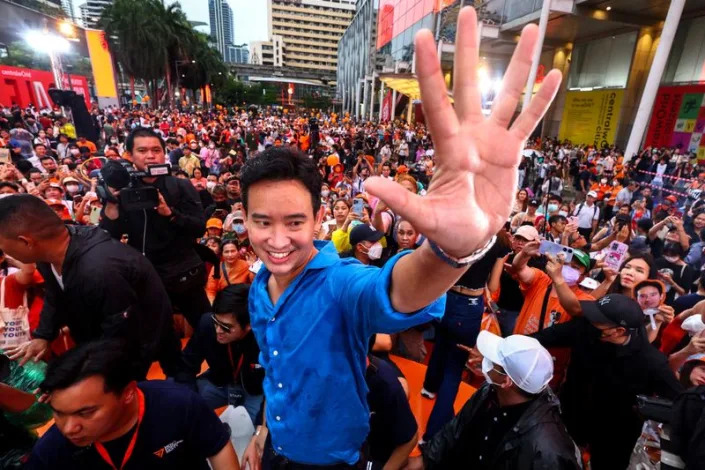
Move Forward Party leader Pita Limjaroenrat thanks voters ahead

Vajiralongkorn, King of Thailand

Move Forward Party leader Pita Limjaroenrat thanks voters ahead
of the vote for a new prime minister on July 13, in Bangkok
Mon, July 10, 2023
By Panu Wongcha-um and Panarat Thepgumpanat
BANGKOK (Reuters) - The role of the monarchy in Thailand is at the core of a looming deadlock that could tip Southeast Asia's second-largest economy into crisis, with reformers once again vying to dislodge the grip on power of the royalist military establishment.
Despite a stunning victory with its allies in a May 14 election over pro-military parties, the progressive Move Forward party led by Pita Limjaroenrat faces an uncertain path to government.
The main reason is that part of Move Forward's political platform is the once-unthinkable proposal to amend Thailand's "lese majeste" law, Article 112 of the criminal code that punishes insulting the monarchy with up to 15 years in prison.
In a country where reverence for the monarch has for decades been promoted as central to national identity, the idea is so radical that minority parties and many members of the appointed Senate have vowed to block Pita from becoming prime minister.
"The proposed amendment is disrespectful and is offensive to the monarchy," Senator Seri Suwanpanon told Reuters.
The military has for decades invoked its duty to defend the monarchy to justify intervention in politics, and used the lese majeste law to stifle dissent, critics say.
In parliament, a giant portrait of King Maha Vajiralongkorn hangs over the chamber where on Thursday members will vote for a prime minister.
But the battle over who gets the job could lead to weeks or even months of deadlock thanks to the votes of a 250-seat Senate, appointed by a junta, that could block the election-winning progressive alliance from securing its choice in a combined vote of both chambers.
The system was set out in a constitution drafted after a 2014 coup led by then-army chief Prayuth Chan-ocha, the prime minister whose party lost badly in the May election.
Much depends on whether Move Forward's main ally, second-place winner Pheu Thai, sticks with it or seeks other coalition partners if Pita's bid looks doomed.
King Vajiralongkorn, 70, who has no role in choosing a government, has remained silent on the lese majeste issue since the election. The Royal Palace did not respond to a request for comment.
SWEEPING CHANGE
Move Forward's proposed amendment reflects cultural changes that have in a few years swept Thailand, where the monarch has for decades been held up as almost semi-divine.
On the surface, much remains the same. The king's portrait hangs on city streets and buildings. The nightly Royal News airs the royal family's good deeds.
But subtle changes are evident. In cinemas, many no longer stand for the royal anthem before every film. Satirical memes spring up on social media before the government orders them removed.
The biggest change, however, is political. In the last election in 2019, no party would have dared suggest amending the lese majeste law.
But Move Forward not only dared, it won the most seats in May though the amendment was only one plank of a progressive platform.
The shift emerged with student-led demonstrations in 2020 that began as protests against military rule but evolved into criticism of what the protesters called a military-palace power nexus, and finally into criticism of the king.
Politicians did not lead the protests but Move Forward called for reform of the lese majeste law when activists began to be charged under it.
About 250 of the 1,900 prosecutions linked to the 2020 protests were under Article 112, according to the group Thai Lawyers for Human Rights.
The prosecution of so many under the law pushed the issue into mainstream discourse, analysts say.
"We can now see the real fault line in politics is the role of the monarchy in Thailand's political order," said Thitinan Pongsudhirak, a political analyst at Bangkok's Chulalongkorn University.
NUMBERS GAME
With many senators expected to vote against Pita for prime minister, Move Forward's 312-seat alliance of eight parties in the 500-seat lower House of Representatives may not be enough to secure him the premiership.
To get to the 376 votes he needs, Move Forward and main partner Pheu Thai need to convince 64 lawmakers from the Senate, or from other parties in the lower house.
If Pita falls short, other scenarios come into play.
Pheu Thai, which has 141 seats to Move Forward's 151, could nominate its prime ministerial candidate with the eight-party alliance intact.
Loyal to self-exiled former Prime Minister Thaksin Shinawatra who was ousted in a 2006 coup, Pheu Thai has been more careful in its messaging on lese majeste, so one of its prime ministerial candidates could win enough votes.
Another possibility is that Pheu Thai seeks other partners in the lower house for a coalition without Move Forward. Pheu Thai, however, is vowing to stick with Move Forward.
Titipol Phakdeewanich, dean of the faculty of political science at Ubon Ratchathani University, said using the law to crush dissent had backfired.
"By over-using Article 112, the conservatives dragged the royal institution deeper into politics," he said.
Move Forward says amending the law will prevent its misuse and benefit the monarchy. It wants the penalty reduced to at most a year in prison, and only the Royal Household Bureau to be able to file a complaint instead of anyone.
"Some senators misunderstood ... accusing Move Forward of wanting to topple the monarchy," party executive committee member Amarat Chokepamitkul told Reuters.
"We want to amend it to maintain good relations between the monarchy and the people."
(Reporting by Panu Wongcha-um and Panarat Thepgumpanat; Editing by Kay Johnson, Robert Birsel)
Mon, July 10, 2023
By Panu Wongcha-um and Panarat Thepgumpanat
BANGKOK (Reuters) - The role of the monarchy in Thailand is at the core of a looming deadlock that could tip Southeast Asia's second-largest economy into crisis, with reformers once again vying to dislodge the grip on power of the royalist military establishment.
Despite a stunning victory with its allies in a May 14 election over pro-military parties, the progressive Move Forward party led by Pita Limjaroenrat faces an uncertain path to government.
The main reason is that part of Move Forward's political platform is the once-unthinkable proposal to amend Thailand's "lese majeste" law, Article 112 of the criminal code that punishes insulting the monarchy with up to 15 years in prison.
In a country where reverence for the monarch has for decades been promoted as central to national identity, the idea is so radical that minority parties and many members of the appointed Senate have vowed to block Pita from becoming prime minister.
"The proposed amendment is disrespectful and is offensive to the monarchy," Senator Seri Suwanpanon told Reuters.
The military has for decades invoked its duty to defend the monarchy to justify intervention in politics, and used the lese majeste law to stifle dissent, critics say.
In parliament, a giant portrait of King Maha Vajiralongkorn hangs over the chamber where on Thursday members will vote for a prime minister.
But the battle over who gets the job could lead to weeks or even months of deadlock thanks to the votes of a 250-seat Senate, appointed by a junta, that could block the election-winning progressive alliance from securing its choice in a combined vote of both chambers.
The system was set out in a constitution drafted after a 2014 coup led by then-army chief Prayuth Chan-ocha, the prime minister whose party lost badly in the May election.
Much depends on whether Move Forward's main ally, second-place winner Pheu Thai, sticks with it or seeks other coalition partners if Pita's bid looks doomed.
King Vajiralongkorn, 70, who has no role in choosing a government, has remained silent on the lese majeste issue since the election. The Royal Palace did not respond to a request for comment.
SWEEPING CHANGE
Move Forward's proposed amendment reflects cultural changes that have in a few years swept Thailand, where the monarch has for decades been held up as almost semi-divine.
On the surface, much remains the same. The king's portrait hangs on city streets and buildings. The nightly Royal News airs the royal family's good deeds.
But subtle changes are evident. In cinemas, many no longer stand for the royal anthem before every film. Satirical memes spring up on social media before the government orders them removed.
The biggest change, however, is political. In the last election in 2019, no party would have dared suggest amending the lese majeste law.
But Move Forward not only dared, it won the most seats in May though the amendment was only one plank of a progressive platform.
The shift emerged with student-led demonstrations in 2020 that began as protests against military rule but evolved into criticism of what the protesters called a military-palace power nexus, and finally into criticism of the king.
Politicians did not lead the protests but Move Forward called for reform of the lese majeste law when activists began to be charged under it.
About 250 of the 1,900 prosecutions linked to the 2020 protests were under Article 112, according to the group Thai Lawyers for Human Rights.
The prosecution of so many under the law pushed the issue into mainstream discourse, analysts say.
"We can now see the real fault line in politics is the role of the monarchy in Thailand's political order," said Thitinan Pongsudhirak, a political analyst at Bangkok's Chulalongkorn University.
NUMBERS GAME
With many senators expected to vote against Pita for prime minister, Move Forward's 312-seat alliance of eight parties in the 500-seat lower House of Representatives may not be enough to secure him the premiership.
To get to the 376 votes he needs, Move Forward and main partner Pheu Thai need to convince 64 lawmakers from the Senate, or from other parties in the lower house.
If Pita falls short, other scenarios come into play.
Pheu Thai, which has 141 seats to Move Forward's 151, could nominate its prime ministerial candidate with the eight-party alliance intact.
Loyal to self-exiled former Prime Minister Thaksin Shinawatra who was ousted in a 2006 coup, Pheu Thai has been more careful in its messaging on lese majeste, so one of its prime ministerial candidates could win enough votes.
Another possibility is that Pheu Thai seeks other partners in the lower house for a coalition without Move Forward. Pheu Thai, however, is vowing to stick with Move Forward.
Titipol Phakdeewanich, dean of the faculty of political science at Ubon Ratchathani University, said using the law to crush dissent had backfired.
"By over-using Article 112, the conservatives dragged the royal institution deeper into politics," he said.
Move Forward says amending the law will prevent its misuse and benefit the monarchy. It wants the penalty reduced to at most a year in prison, and only the Royal Household Bureau to be able to file a complaint instead of anyone.
"Some senators misunderstood ... accusing Move Forward of wanting to topple the monarchy," party executive committee member Amarat Chokepamitkul told Reuters.
"We want to amend it to maintain good relations between the monarchy and the people."
(Reporting by Panu Wongcha-um and Panarat Thepgumpanat; Editing by Kay Johnson, Robert Birsel)


















